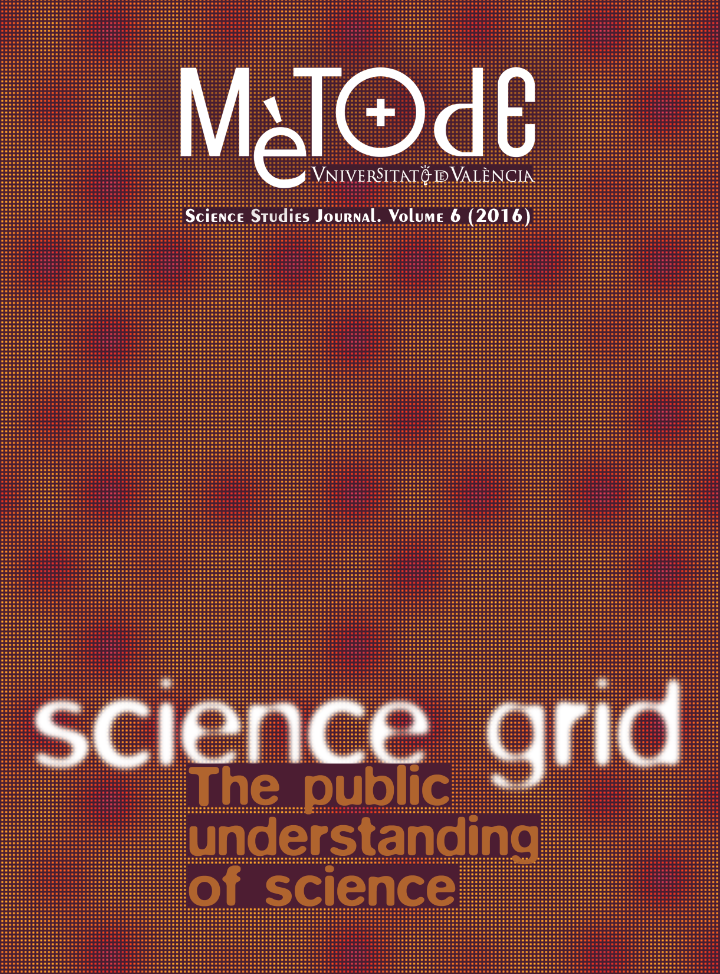Is there a hole in the ozone layer of your climate change? From scientific culture to popular culture
DOI:
https://doi.org/10.7203/metode.0.4219Keywords:
scientific culture, popular culture, social representation, climate change, ozone Abstract
Abstract
Eight out of ten Spaniards think the hole in the ozone layer, caused by human actions, is the key physical cause of climate change. This belief, constructed from scientific elements (concepts, images, icons, discourse), is a product of popular culture. Science has never confirmed this relationship. It was the ability of popular culture to incorporate scientific «objects» according to its own epistemology that established and popularised the idea until it became a global cultural belief. The divergence between social and scientific representation invites us to reflect upon how contemporary societies embrace and remodel scientific culture to construct representations for interpreting reality and directing responses (or inaction) to threats identified by science.
 Downloads
Downloads
 References
References
Arto, M. (2010). El cambio climático narrado por alumnos de educación primaria y secundaria: Propuesta de análisis para dibujos y textos. In M. Junyent, & L. Cano (Coord.), Investigar para avanzar en educación ambiental. Madrid: Ministerio de Medio Ambiente, Medio Rural y Marino.
Brechin, S. R. (2010). Public opinion: A cross-national view. In C. Lever-Tracy (Ed.), Routledge International Handbook of Climate Change and Society. New York: Routledge Press.
Capstick, S., Whitmarsh, L., Poortinga, W., Pidgeon, N., & Upham, P. (2014). International trends in public perceptions of climate change over the past quarter century. WIREs Climate Change. doi: 10.1002/wcc.321
Leiserowitz, A. A. (2006). American risk perceptions: Is climate change dangerous? Risk Analysis, 5–6, 1433–1442.
Meira, P. A. (2006). Las ideas de la gente sobre el cambio climático. Ciclos: Cuadernos de Comunicación, Educación e Interpretación Ambiental, 18, 5–12.
Meira, P. A., Arto, M., & Montero, P. (2009). La sociedad ante el cambio climático. Conocimientos, valoraciones y comportamientos en la sociedad española. Madrid: Fundación Mapfre.
Meira, P. A., Arto, M., Montero, P., & Heras, F. (2011). La sociedad ante el cambio climático. Conocimientos, valoraciones y comportamientos en la sociedad española. Madrid: Fundación Mapfre.
Meira, P. A., Arto, M., Heras, F., Iglesias, L., Lorenzo, J. J., & Montero, P. (2013). La respuesta de la sociedad española ante el cambio climático. 2013. Madrid: Fundación Mapfre.
Moscovici, S. (1979). El psicoanálisis, su imagen y su público. Buenos Aires: Huemul. (Original published in 1961).
Oreskes, N., & Conway, E. M. (2010). Merchants of doubt. How a handful of scientists obscured the truth on issues from tobacco smoke to global warming. New York: Bloomsbury.
Sperber, D. (2005). Explicar la cultura. Un enfoque naturalista. Madrid: Morata.
Ungar, S. (2000). Knowledge, ignorance and the popular culture: Climate change versus the ozone hole. Public Understanding of Science, 9, 297–312. doi: 10.1088/0963-6625/9/3/306
Ungar, S. (2007). Public scares: Changing the issue culture. In S. C. Moser, & L. Dilling (Eds.), Creating a climate for change. Communicating climate change and facilitating social change. Cambridge: Cambridge University Press.
Downloads
Published
How to Cite
-
Abstract1778
-
PDF555
Issue
Section
License
![]()
All the documents in the OJS platform are open access and property of their respective authors.
Authors publishing in the journal agree to the following terms:
- Authors keep the rights and guarantee Metode Science Studies Journal the right to be the first publication of the document, licensed under a Creative Commons Attribution-NonCommercial-NoDerivatives 4.0 International License that allows others to share the work with an acknowledgement of authorship and publication in the journal.
- Authors are allowed and encouraged to spread their work through electronic means using personal or institutional websites (institutional open archives, personal websites or professional and academic networks profiles) once the text has been published.





